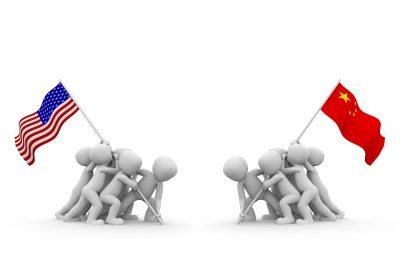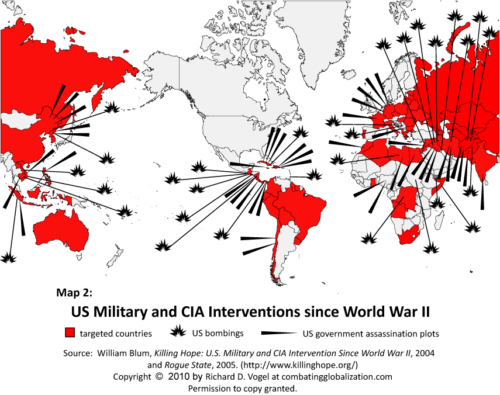Does Repeatedly Calling China a Threat Reify It?

All Global Research articles can be read in 51 languages by activating the “Translate Website” drop down menu on the top banner of our home page (Desktop version).
To receive Global Research’s Daily Newsletter (selected articles), click here.
Visit and follow us on Instagram at @crg_globalresearch.
***
Hegemony requires a coordinated mechanism to be in place for a belligerent entity to designate enemies, attack the leader(s) of the designated enemy, control the narrative (i.e., lie), launch unprovoked attacks that murder a citizenry, destroy the economic basis of the named enemy, loot its resources, topple the enemy’s leadership, and replace the leadership with one deemed acceptable to the attacking entity. Such a mechanism is multifaceted, and it requires a government, industry, military, and media that operate as a unit, along with other supporting facets. The United States is an entity that functions to support capitalism, imperialism, militarism, and situate itself as the global hegemon. The profit from the violence is funneled to the American plutocratic class.
One supporting facet of empire is the think tanks that are called upon to produce propaganda and disseminate disinformation through its mass media. In the US, one highly influential think tank is the Council on Foreign Relations (CFR).
In the book Wall Street’s Think Tank, author Laurence Shoup examines the CFR think tank. In its review of Shoup’s book, the socialist magazine Monthly Review wrote:
The Council on Foreign Relations is the world’s most powerful private foreign-policy think tank and membership organization. Dominated by Wall Street, it claims among its members a high percentage of past and present top U.S. government officials as well as corporate leaders and influential figures in the fields of education, media, law, and nonprofit work… Shoup argues that the CFR now operates in an era of “Neoliberal Geopolitics,” a worldwide paradigm that its members helped to establish and that reflects the interests of the U.S. ruling capitalist class.
If the US is going to wage serial wars, then it knows that it needs to stir up patriotic fervor to rally public support for the fighting forces. Therefore, it is critically important to control the narrative. In the case of the CFR, it has its own in-house media to assuage the message — the journal Foreign Affairs.
In an article on 2 November, Foreign Affairs (FA) continues to demonize China, but it also cautions against the US putting all its militaristic eggs in the China basket. It calls for a balancing of US foreign policy. After all, there are plenty of other designated enemies out there.
FA: “In view of its global economic weight, rapidly expanding military capabilities, illiberal values, and growing assertiveness, Beijing poses a formidable long-term threat to American security and freedom.”
Analysis: From the Chinese perspective, the same could be said of the US — but magnified. The US is still the largest economy by the GNP metric. It has by far the largest military budget in the world, one that exceeds the spending of the next 11 countries. Moreover, the US has been deeply immersed in warring ever since its founding in 1776 — a founding based in the genocide of the Original Peoples. How is that for assertiveness? In contrast, China has not been at war for over 40 years, and this war lasted less than four weeks. So who poses “a formidable long-term threat” to who? Is the Chinese navy conducting so-called freedom-of-navigation exercises through waters off the coast of the US?
Why this tendentious freedom-of-navigation descriptor? When has China ever stated that marine traffic was not permitted through the South China Sea? Foreign ministry spokesman Zhao Lijian said, “With the joint efforts of countries in the region including China, passage through the South China sea has been smooth and safe for a period of time, and not a single vessel has ever reported that its navigation is hindered or safety threatened in the South China Sea. The US allegation of ‘freedom of navigation’ in the South China Sea threatened is simply untenable.”
Yet, FA says that Biden must keep challenging China on passage through the South China Sea. Obviously, there is nothing peaceful about US maneuvers in the South China Sea as Zhao noted, “[T]he US willfully sends large-scale advanced vessels and aircraft to the South China Sea for military reconnaissance and drills and illegally intruded into China’s territorial waters and space and water and air space adjacent to islands and reefs. Since the beginning of this year, the US side has conducted close-in reconnaissance for nearly 2,000 times and over 20 large-scale military drills on the sea targeting China.”
Moreover, is China encircling the US with military bases, as the US has encircled China?

Lastly, what is launching wars if not a decidedly illiberal value. It seems that right off the bat that FA has been hoisted on its own petard.
FA: “Biden has said that Chinese President Xi Jinping is ‘deadly earnest on becoming the most significant, consequential nation in the world.’”
Analysis: What level of readership intelligence is FA targeting? Isn’t the proper response: so what? After all, which country strives to be insignificant or inconsequential? Isn’t striving for esteem bound with the essence of patriotism, love of country? Cheer for your team?
FA: “At the Pentagon, China is said to be the ‘pacing threat,’ while Secretary of State Antony Blinken describes U.S. relations with it as ‘the biggest geopolitical test’ of the twenty-first century. Going further, the undersecretary for policy at the U.S. Defense Department has described China strategy as involving not one element of national power, or even the entirety of the U.S. government, but rather a ‘whole-of-societyapproach.’”
Analysis: As for pacing threat, US Department of Defense chief Lloyd Austin defined it thus: “It means that China is the only country that can pose a systemic challenge to the United States in the sense of challenging us, economically, technologically, politically and militarily.” Do Austin and his colleagues mean that everything is hunky dory so long as China doesn’t develop too much to upset the US top dog?
FA: “And among the primary rationales for Biden’s withdrawal from Afghanistan has been to free up resources for China instead.”
Analysis: Should the US have continued to sacrifice the lives and well-being of its soldiers in Afghanistan? And it should be mentioned to continue threatening the lives and livelihoods of Afghanis? Wasting trillions of dollars to subdue goat herders with AK-47s is usually not a great strategy (with all due respect to goat herders bravely resisting foreign invaders).
In the aftermath of the US pullout, China sits well positioned to engage in win-win trade with Afghanistan and expand the Belt and Road Initiative.
FA: “In view of Beijing’s ascendance, it is entirely reasonable for American policymakers to seek to devote new diplomatic, economic, and military resources to the challenge.”
Analysis: How long do the American politicians figure they can keep a nation of 1.4 billion people down? And they can’t do this because China is rising. It has eliminated poverty. It leads in supercomputer technology. China has built the world’s fastest programmable quantum computers, said to be 10 million times faster than the world’s current fastest supercomputer. China has built the world’s first integrated quantum communication network, “combining over 700 optical fibers on the ground with two ground-to-satellite links to achieve quantum key distribution over a total distance of 4,600 kilometers for users across the country.” In AI, China claimed 35% of the global robotics patents between 2005 and 2019 (25,000), almost three times more than the 9,500 robotics patents received by the US during the same time. China has also made massive strides in space exploration. And this is just a snippet of China’s growing technological and scientific prominence. (For more see Godfree Roberts’s extremely informative China resource).
FA: “Defending Asia against Chinese hegemony is important…”
Analysis: In The Governance of China (Beijing: Foreign Languages Press, 2014, location 3918) chairman Xi Jinping said with crystal clarity,
As China continues to grow, some people start to worry. Some take a dark view of China and assume that it will inevitably become a threat as it develops further. They even portray China as a terrifying Mephisto who will someday suck the soul of the world. Such absurdity couldn’t be more ridiculous, yet some people, regrettably, never tire of preaching it. This shows that prejudice is indeed hard to overcome.
The American side, however, likes to think that if it parrots the China-hegemon mantra often enough that it must be so in the minds of others; this is despite Chinese officials on several occasions stating otherwise. Do not actions speak louder than words?
Noam Chomsky got it right when he responded to the threat of China:
I mean, everyone talks about the threat. When everyone says the same thing about some complex topic, what should come to your mind is, wait a minute, nothing can be that simple. Something’s wrong. That’s the immediate light that should go off in your brain when you ever hear unanimity on some complex topic. So let’s ask, what’s the Chinese threat?
FA: “Beijing sees the United States and Europe as two power centers rather than one allied bloc and has long sought to drive wedges into the transatlantic relationship… China needs to understand that the United States and its allies are united in countering its economic and military pressure…”
Analysis: The fact that FA merely opines that this is so (and opinion it is since no substantiation was provided for such a claim) is hardly compelling. Besides a simple comparison between China and the US reveals the inanity of the FA article: Which country resorts to initiating sanctions against other countries? Which country is engaged in warring against other countries?
The FA article ends with a rather damning quotation: “As former Secretary of Defense Robert Gates has said, ‘In the 40 years since Vietnam, we have a perfect record in predicting where we will use military force next. We’ve never once gotten it right.’”
If the US would ever decide to use military force against China (which it won’t because that would risk a nuclear conflagration in which there are no winners as that would end life on Earth as we know it), then it would have gotten it wrong for the last time.
*
Note to readers: Please click the share buttons above or below. Follow us on Instagram, @crg_globalresearch. Forward this article to your email lists. Crosspost on your blog site, internet forums. etc.
Kim Petersen is a former co-editor of the Dissident Voice newsletter who lived several years in China. He can be emailed at: kimohp@gmail. Twitter: @kimpetersen. He is a frequent contributor to Global Research.
Featured image is from Pixabay

